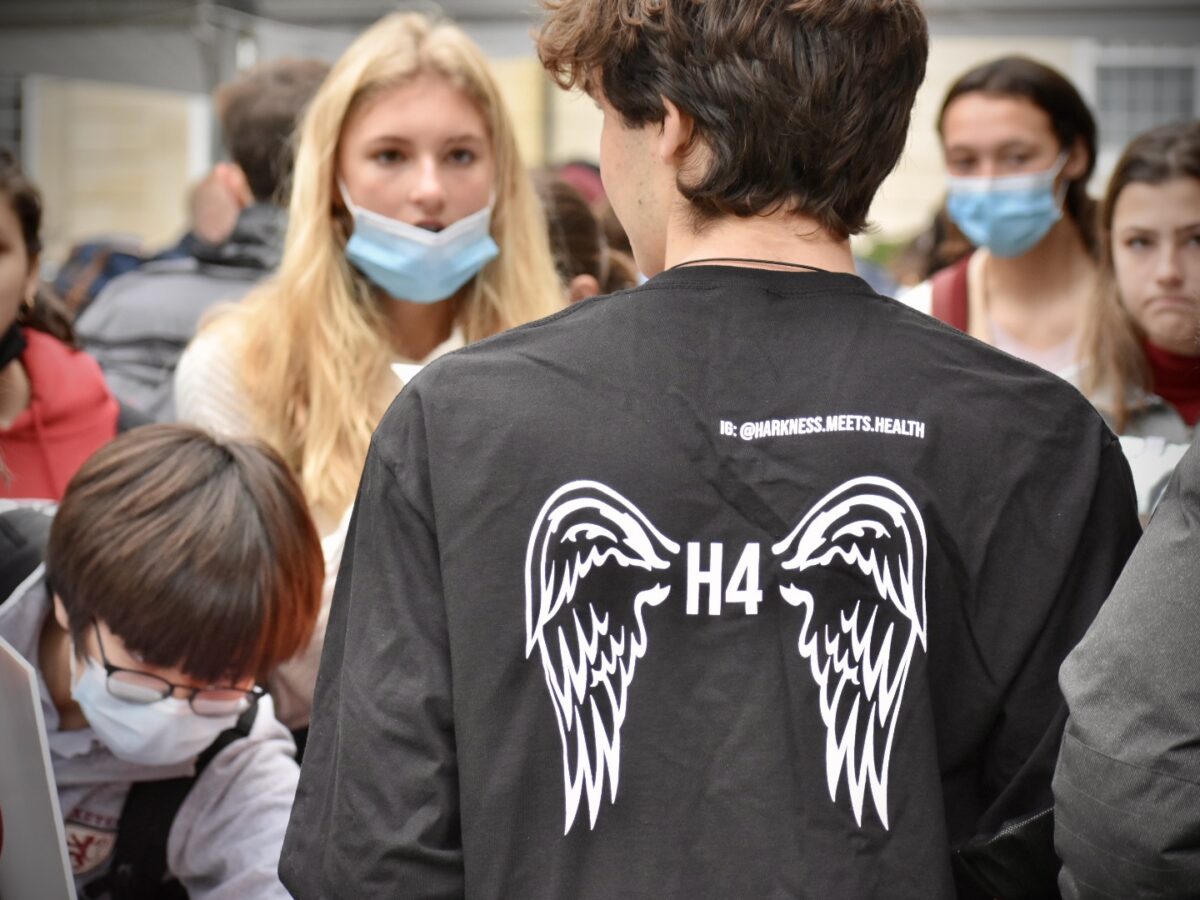Established by current Dean of Residential Life Carol Cahalane to help disseminate student health information, H4’s earliest efforts included distributing newsletters with timely health suggestions around campus, even taping them to the walls of bathroom stalls. While Health’s Angels still produce and distribute newsletters, “we wanted to grow the program into a peer education program,” says Michelle Soucy, chair of the department of Health Education and a Health’s Angel adviser. “If you’re trying to send a healthy message to teens, it’s going to be more successful coming from their peers than adults.”
Members of Health’s Angels are lowers, uppers and seniors who completed a year of health education; they’re invited by health faculty to apply to be in the group. Through their work, they can become nationally certified peer educators. “Our goal is to have a diverse range of health educators — day students, boarding students, athletes, non-athletes — a group of kids who wouldn’t normally work together,” Soucy says.
The Angels’ weekly lunches with Soucy and other health educators are an opportunity to connect, brainstorm and have fun. Wellness initiatives and events are created based on feedback from peers. The positive psychology fair was their first major event; during “Hell Weeks” (the busy two weeks between Thanksgiving and winter breaks), the Angels hung oversized mandalas in Agora for students to color as a relaxation exercise. They’ve also produced bookmarks with suggested language for students to use if they want to access counseling on campus. Members also lead “House Calls,” a 15-minute program focusing on specific topics like sexual health, nutrition and stress for dorm residents or sports teams. “The kids are really dedicated to improving health on our campus, especially mental health,” says Soucy.

Venci was excited to join Health’s Angels as a lower. “I joined because I wanted to be a positive voice of change and let people know there are others who want to support them,” he says. “I think that’s helpful to hear, especially for new students.” He adds, “Health’s Angels feels like a collaboration with your best friends. I always look forward to our lunches.”
Chen agrees. “Everyone’s so excited to do this work,” she says. As a proctor in Williams House, she regularly talks to students about health concerns. “My dorm has struggled with dietary habits and eating right because everyone is so busy,” she says. “I talk to them a lot about maximizing dining hall options and establishing eating patterns and schedules.”
Future health events include a tour of the athletic facilities, including Downer Family Fitness Center, for non-athletes, introducing students to the trainers and teaching them proper use of the fitness equipment. “A lot of people are intimidated by the gym,” says Malcolm John ’22. “It’s a barrier to so many people’s fitness. We can show people it’s not scary and how to use the gym effectively.”
Being a Health’s Angel has changed Chen’s definition of what it means to be healthy. “I have a more nuanced understanding of health issues here at Exeter,” she says. “I take much better care of myself. Health’s Angels has made me a better proctor and friend.”
That’s worth smiling about.







 If you think the research needed to complete the notorious History 333 paper is exhaustive, consider Lockwood’s mission over the past five years: Traveling — mainly by bicycle — in 20 countries on six continents to document
If you think the research needed to complete the notorious History 333 paper is exhaustive, consider Lockwood’s mission over the past five years: Traveling — mainly by bicycle — in 20 countries on six continents to document  On Jan. 18, 1958,
On Jan. 18, 1958,  Clifford is a dual threat — a best-selling novelist and an award-winning journalist — who fell in love with writing as a reporter for The Exonian. “It was the best education of my life — it was so hard — I learned how to work, I learned how to hit deadlines in a way that I think a lot of people never have to,” she told a virtual assembly last year. Her second novel, “The Farewell Tour,” will be published in 2023 by HarperCollins.
Clifford is a dual threat — a best-selling novelist and an award-winning journalist — who fell in love with writing as a reporter for The Exonian. “It was the best education of my life — it was so hard — I learned how to work, I learned how to hit deadlines in a way that I think a lot of people never have to,” she told a virtual assembly last year. Her second novel, “The Farewell Tour,” will be published in 2023 by HarperCollins.








